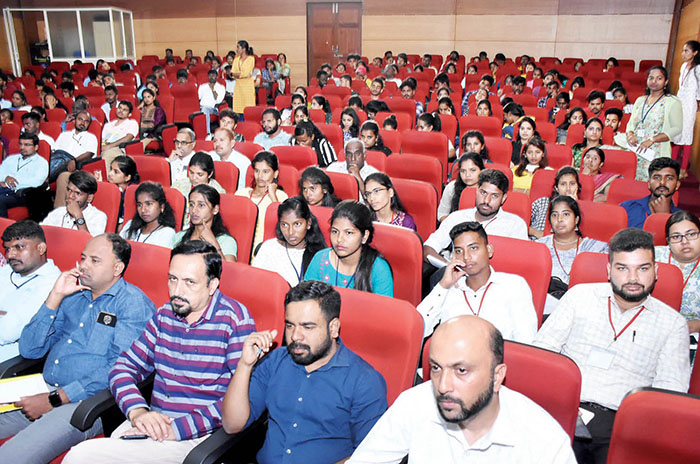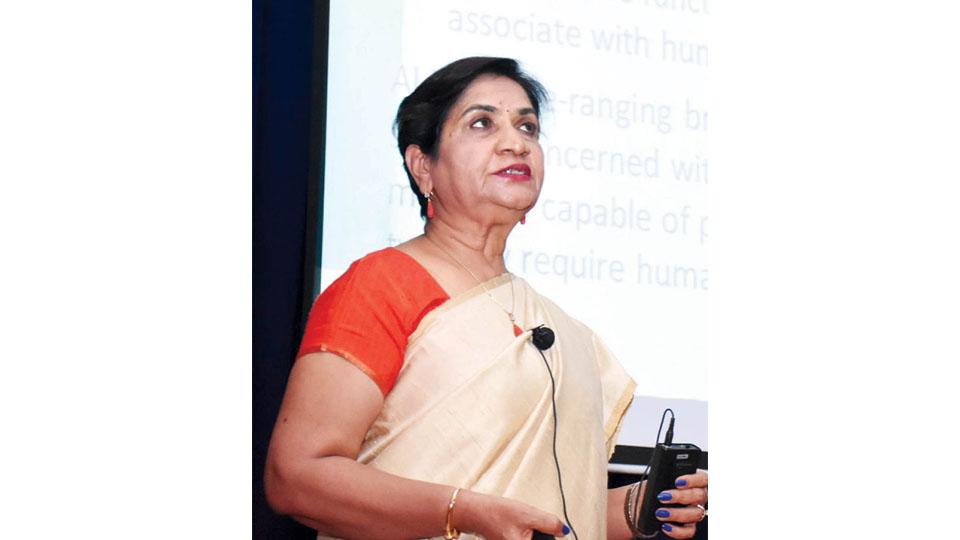Special lecture on OpenAI’s tool and its impact on academic writing, limitations
Mysore/Mysuru: ChatGPT has the potential to revolutionise the realms of education, research and academia owing to its advanced natural language processing capabilities, according to the insights shared by Prof. Shalini R. Urs, former Professor of Library and Information Science at the University of Mysore.
She was speaking recently at a special lecture titled ‘ChatGPT and Academic Writing’ jointly organised by the Departments of Library and Information Science, Journalism and Mass Communication, English, and Computer Science at Vijnana Bhavana, Manasagangothri.
In her lecture, Prof. Shalini Urs raised awareness about the potential influence of ChatGPT, an AI chatbot created by OpenAI. This chatbot is proficient in generating responses to diverse inquiries and has garnered attention due to its rapid emergence and multifaceted content creation capabilities encompassing text, images and code. She highlighted the transformative effect on content creation, including academic writing, facilitated by this technology.
The core technology that propels ChatGPT is the concept of Large Language Models (LLMs). These models, powered by extensive artificial neural
networks, excel in tasks related to natural language processing, such as generating text and performing classification. Leveraging billions of parameters, LLMs exhibit remarkable capabilities.
Prof. Shalini Urs delved into the realm of academic writing, a critical component of scholarly communication. She elucidated the two distinct types: Student and expert academic writing, both necessitating precision, research and lucidity. The potential of AI in enhancing academic tasks, including data analysis, literature review and experiment design and optimisation was underscored. Notably, ChatGPT has the capacity to aid in idea generation, citation management and essay refinement.
The presentation not only demystified the academic writing process but also underscored the role of ChatGPT as a virtual assistant for amplifying efficiency. Prof. Shalini Urs emphasised the ethical utilisation of AI tools to augment academic writing endeavours while upholding integrity and ethical standards.

During his keynote speech, Prof. Muzaffar H. Assadi from the Department of Political Science and In-Charge Chairman of the Department of English, underlined the imperative of harnessing the advantages offered by AI for societal progress. However, he cautioned against the evident threats that have emerged within communities.
Prof. Assadi pointed out that AI has the potential to exacerbate societal divisions, creating a dichotomy between individuals with AI-related advantages and those without.
The impact of AI on existing civilisation, which revolves around human affairs, has been likened to the solemn toll of a funeral bell. The power of AI is so immense that it’s being equated to a new revolution, succeeding the scientific revolution that has shaped our world.
Nevertheless, this technological leap is accompanied by adverse effects, particularly concerning the job market and workforce. The advent of AI-driven news anchoring is just the initial phase of a much broader transformation. It represents a mere fraction of the changes AI is poised to bring to diverse sectors.
This transition is often referred to as the tip of the iceberg, implying that there’s a substantial depth of change lying beneath the surface. Prof. Assadi provided a prudent piece of advice to students, stressing the judicious and thoughtful use of ChatGPT and similar AI tools. This counsel stems from the recognition that while AI can be a potent asset, it requires responsible handling to navigate potential pitfalls and unintended consequences.
Prof. N.S. Harinarayana, Chairman of the Department of Library and Information Science, facilitated the discussion and shed light on the clash between traditional academic methods and advanced AI technology, addressing concerns about the potential impact of ChatGPT on the authenticity of academic writing.
The event also saw participation from Prof. H.S. Nagendraswamy, Chairman of the Department of Studies in Computer Science, Prof. M.S. Sapna, Chairman of the Department of Studies in Journalism and Mass Communication and Prof. M. Chandrashekara from the Department of Studies in Library and Information Science.








Recent Comments